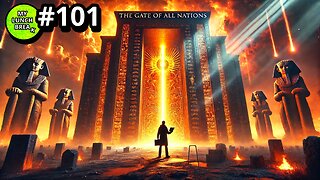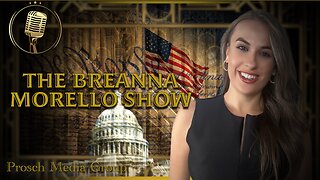Premium Only Content
![What if the Templar Knights Were Not Executed [EXPOSED in 5 minutes]](https://1a-1791.com/video/s8/1/Z/2/J/7/Z2J7m.EQ4e-small-What-if-the-Templar-Knights.jpg)
What if the Templar Knights Were Not Executed [EXPOSED in 5 minutes]
What if the Templar Knights Were Not Executed
Imagine this!!! What if Jacques de Molay and the Templar Knights were not murdered?Here is an insight of what COULD have happened.Take a listen to this theory.
In the year 1307, a pivotal moment in history unfolded when King Philip IV of France and Pope Clement V decided to spare the Templar Knights from persecution and execution.
Little did they know that this decision would shape the course of the world for centuries to come.
As the sun set on that fateful day, and Jacques de Molay left the funeral of Catherine of Courtney, the Templar Knights continued their mission.
They continued, undisturbed, guarding the Holy Land and preserving ancient knowledge.
Their influence extended far beyond their superior military prowess, as their expertise in finance, trade, and architecture made them indispensable to monarchs and leaders across Europe.
The Templar Knights, with their vast financial acumen, played a pivotal role in reshaping the political landscape of Europe and beyond.
As they continued to accumulate wealth, their influence extended beyond the confines of their own order.
They became the world's most formidable creditors, and their ability to force the repayment of debts from several kings and rulers shifted the power dynamics in many countries.
In the decades that followed, the Templars expanded their influence, becoming trusted advisors to kings and popes alike.
In the early 14th century, as the world began to feel the financial strain of wars and conflicts, many monarchs found themselves indebted to the Templars.
Kings who had once held absolute power now had to contend with the Templar Order's influence.
To secure their thrones and maintain their sovereignty, these monarchs were compelled to enter into agreements with the Templars, ceding some of their authority in exchange for financial support and protection.
Would that have been a positive or a negative?
We would hope, that their vast wealth was used to fund great works of art, science, and education.
The Templar Order established universities and libraries, fostering a renaissance of learning that would rival the famous Italian Renaissance of the 14th and 15th centuries.
As the years passed, the Templars championed religious tolerance and interfaith dialogue, helping to bridge the gap between Christians, Muslims, and Jews.
Their commitment to diplomacy rather than conquest allowed for the peaceful coexistence of these faiths in the Holy Land, setting a precedent for religious harmony that would be emulated around the world.
During the Age of Exploration, Templar explorers embarked on voyages of discovery.
They charted new lands, exchanged knowledge with indigenous peoples, and promoted cultural exchanges.
They may have landed, in what we know as the United States, first.
What would that have looked like now?
This era of exploration and cooperation between civilizations would have ushered in a new age of global understanding.
The Enlightenment, which typically began in the 17th century, was accelerated by the Templar's emphasis on knowledge and reason.
This intellectual movement led to rapid advancements in science, technology, and governance.
The Templars played a pivotal role in promoting democratic ideals and the separation of church and state.
By the 20th century, the world was a vastly different place.
Wars were rare, and conflicts were resolved through diplomacy and dialogue.
Poverty and disease were nearly eradicated, thanks to the Templar's philanthropic efforts and commitment to social justice.
Their lack of a political agenda was non-existent.
In this alternate reality, the Templar Order still existed in the 21st century.
By the 21st century, the global balance of power had shifted dramatically.
Monarchs were no longer the absolute rulers they had once been, and democratic governance was the norm.
The Templars, while still guardians of financial stability, had transitioned into a global council of wise advisors, fostering cooperation among nations and ensuring that the lessons of history were not forgotten.
They had evolved into a global organization dedicated to preserving peace, fostering education, and advancing human rights.
From a financial standpoint, would the be the FED that we know today?
Our hopes in this scenario.
That their symbol, the cross within the shield, became a universal emblem of hope and unity.
Today, the world stands as a testament to what could have been if King Philip and Pope Clement had chosen a different path in 1307.
It is a world where the Templars, once persecuted, became the champions of progress and harmony, guiding humanity toward a brighter future.
The legacy of their compassion, wisdom, and dedication to the betterment of humanity continues to inspire generations, reminding us of the potential for greatness that lies within us all.
Think about this though, had the Templar Knights not been executed, would Freemasonry be what it is today?
Give us your thoughts of what you think would have happened had the Knights not been executed and went into hiding.
-
 20:01
20:01
Old Fashion Masonic Podcast
8 months agoJames Naismith; Inventor of Basketball and a Masonic Hero Thief? S2 E71
191 -
 10:03
10:03
Tundra Tactical
5 hours ago $4.77 earnedBrandon Herrera Vies Bid for ATF Director!
24.7K3 -
 22:01
22:01
DeVory Darkins
1 day ago $17.90 earnedHakeem Jeffries SHUTS DOWN The View as Matt Gaetz Speaks out
27.8K75 -
 2:02:54
2:02:54
Mally_Mouse
4 hours agoLet's Play!! - Spicy Saturday
17.1K -
 1:33:06
1:33:06
Slightly Offensive
4 hours ago $15.34 earnedAre You Ready for What's Coming Next? | Just Chatting Chill Stream
37.2K16 -
 32:10
32:10
MYLUNCHBREAK CHANNEL PAGE
1 day agoThe Gate of All Nations
92.3K41 -
 13:07
13:07
Sideserf Cake Studio
9 hours ago $1.02 earnedIS THIS THE MOST REALISTIC SUSHI CAKE EVER MADE?
26.9K1 -
 21:08
21:08
Clownfish TV
1 day agoElon Musk Tells WotC to BURN IN HELL for Erasing Gary Gygax from DnD!
21.7K8 -
 48:22
48:22
PMG
4 hours ago $3.90 earned"IRS Whistleblowers Speak Out on Biden Family with Mel K In-Studio"
17.9K6 -
 2:59
2:59
BIG NEM
6 hours agoLost in the Wrong Hood: Who Do I Check In With?
14.3K2